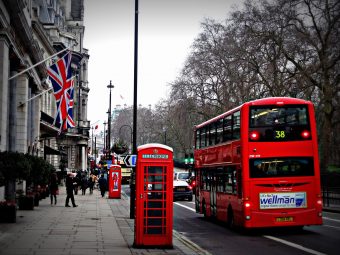
The UK has become the 111th country to ratify the Paris climate agreement, which aims to avoid the most devastating effects of climate change by cutting carbon emissions.
The foreign minister, Boris Johnson, who has flirted with climate scepticism, signed the pact in London on Thursday after a parliamentary deadline passed on Wednesday night, with no objections raised.
Speaking at the UN climate summit in Marrakech, Nick Hurd, the industry and climate minister, said: “The UK is ratifying the historic Paris agreement so that we can help to accelerate global action on climate change and deliver on our commitments to create a safer, more prosperous future for us all.
“I hope this will send a very strong message of continued international commitment to implement Paris because it is obviously very important to send that signal out.”
Salaheddine Mezouar, the Moroccan foreign minister and president of the COP22 summit, told the Guardian: “It is excellent news that the UK has ratified, and it comes at the right moment. It is a good response to all those people who are sceptical about climate change.”
The US election of Donald Trump, who has renounced climate science and promised to withdraw from the Paris agreement, has fed anxiety about future efforts to contain climate change.
But while the UK’s Brexit vote may be moving the country closer to the US geopolitically – and has literally shifted its climate summit pavilion from the EU to the US tent – its endorsement of the Paris deal was widely welcomed as a boost to the Paris treaty.
Greenpeace UK’s chief scientist, Doug Parr said that having set a target for curbing carbon emissions, the UK now needed to find the quickest and cheapest route to get there.
“A mix of renewables, battery storage and efficiency measures is the way to go,” he said. “If Theresa May wants to have an industrial strategy that can cut emissions, create jobs, and help keep down bills, she should put low-carbon infrastructure at its heart.”
The UK’s negotiating partners may also look to May to keep in check climate-sceptic impulses among some of her own ministers. Johnson has irreverently described the global leaders who drafted the Paris treaty as driven by “a primitive fear” that warmer weather was caused by humanity – a fear that he described as “without foundation”.
Hurd said such talk should be taken with a pinch of salt: “Words count for one thing. You look for proof points. I think the fact that within days of this administration taking over, one of its first acts was to put into law the fifth carbon budget is an important proof point.”
The shadow climate minister, Barry Gardiner, said: “The UK government must now show their commitment through climate action on the ground. We face a 47% shortfall to meet our 2030 climate target. Pursuing fracking and a six-fold tax hike on solar business rates only take us in the wrong direction.”
To meet its climate commitments, the UK will have to decarbonise the lion’s share of its electricity by 2030 according to the government’s official advisers, the committee on climate change (CCC).
The government’s strategy currently favours an expansion in nuclear power and fracking for shale gas, the latter of which could ramp up carbon emissions if it is not displacing coal. Controversially, it has also rowed back support for solar and onshore wind power.
Clean energy business groups, though, welcomed today’s announcement as a sign that the UK would continue to play a progressive role in the international climate process.
Stephanie Pfeifer, the CEO of the Institutional Investors Group on Climate Change, which represents investors with over €14tn (£12tn) of assets in clean energies, said: “This encouraging announcement can only help sustain the ‘spirit of Paris’ and the momentum behind the international consensus to drive substantial action on climate change.”
Jill Duggan, the director of The Prince of Wales’s Corporate Leaders Group(CLG), said: “The UK government’s ratification of the agreement today sends an important signal to international allies, businesses and investors about the inevitable transition towards a zero carbon economy.”
Sir Crispin Tickell, former British ambassador to the United Nations, said: “Britain’s ratification of the historic Paris agreement is an important moment, not least because our country has for a long time led global efforts to cope with the effects of climate change.”
Source: theguardian.com

